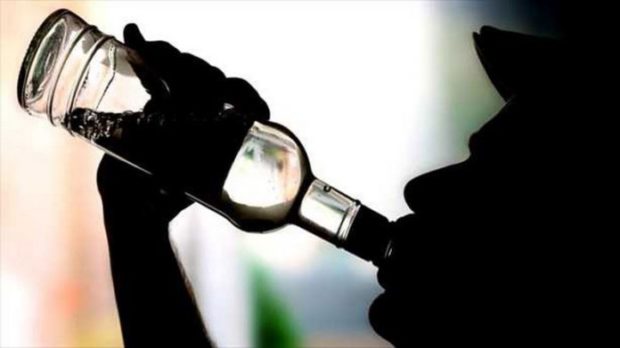Sobriety coach and author Simon Chapple guides you through some early, achievable steps to take if you want 2023 to feature a different relationship with alcohol
How to stop drinking alcohol in Dry January or beyond
Patricia Marroquin
Today is your first day alcohol-free as you embark on how to stop drinking. You might be feeling excited, nervous or even scared of the journey ahead. It is common to experience a combination of all three. Please don’t worry – we are going to do this together. Know that at times, there is likely to be an element of discomfort in the form of cravings and unstable emotions, but these feelings will always pass. Experiencing the feeling of them arriving and then leaving is important, as you will draw strength from the knowledge that you have the power in these situations.
Stay strong in the face of any fears, emotions or challenges that come up – no matter how difficult they feel at the time, you need to sit with them until they fade. Every time you allow discomfort to pass without reacting, you will become stronger. This is part of the process and what will set you up for long-term success as you go forward.
Throughout my book, How to Quit Alcohol in 50 Days: Stop Drinking and Find Freedom, I examine our beliefs about alcohol and how it features in our lives. I make no apology for repeating myself on these points, as I firmly believe that if we can form new beliefs and do away with the ones that are holding us back, we can unlock the door to changing our mindset. If we can change our mindset about alcohol, we can quit drinking without huge amounts of willpower or any sense of loss or frustration. We can actually enjoy the life choice we have made for ourselves and have fun at the same time. We want to move from a place where we feel a sense of deprivation that we “can’t have” a drink to a feeling that alcohol is unimportant and insignificant: that we simply “don’t want” a drink.
The way I and thousands of other people have made that shift is by unlocking limiting beliefs and finding new, healthy beliefs that are not holding them back from being the person they want to be. I was totally obsessed with drinking for more than two decades, and after I quit I became a little fixated on sobriety and the new life I had created for myself – it felt so good that I knew I would never drink again. But I didn’t see sobriety as simply “Simon doesn’t drink”. It was a complete lifestyle choice that I felt empowered in making and the start of a wonderful journey of finding things out about myself that booze had kept hidden away from me for years.
The stages to alcohol freedom and how to stop drinking
1. Unawareness
When someone has a problem with alcohol use but doesn’t acknowledge or even care about it, carrying on with their behaviour regardless of the impact it is having on their life. Sadly, this is where many people stay stuck, often because they (wrongly) believe their life will be worse without alcohol.
2. Awareness
This can be the most painful part of the journey to freedom. I found it really uncomfortable and stayed at this point for around five years. I had become aware I had a problem, and part of me felt that I should do something about my drinking, but all I did was drink more to blot out the thoughts. I lived with internal conflict around my drinking, stuck in a place where I knew I had to do something but not knowing what to do for the best. The good news is that most people don’t usually live with the discomfort for as long as I did, and end up deciding that change is the only positive way forward.
3. Education
Once we have become aware of the problem and decide we need to do something about it, then we start to learn about the tools, tactics and support that will help us get to where we want to be. Sober books, podcasts, blogs and videos all helped me expand my knowledge and educate myself, in turn helping me form new beliefs and change my mindset.
4. Practice
While we can write down new beliefs that we feel are true and honest and reflect the life we want for ourselves, we also need to put them into practice. Just like learning a new skill, sobriety takes a bit of practice in order to move on to complete mastery. For example, if you believe that you can’t have fun without drinking and write down a new belief to stop limiting yourself from only being able to have fun if you can have alcohol, at some point you will need to get out into the big wide world and prove to yourself that you really can have a great time without having drink involved. As you engage in more and more experiences alcohol-free, your new beliefs become rock solid and totally true because they are now based on factual evidence that you can’t argue with.
5. Mastery
The more you practise, the stronger your new beliefs will become, and as you spend more time alcohol-free the less you will think about drinking. I found that after four or five months I was in a place where I felt like I had mastered a sober life. I was rarely thinking about drinking and found myself so much happier, as well as being fully present and engaged in the new healthy activities I had become involved in. It can take time to get to this stage, but it gets easier and easier with every day that passes. Today is the first day on your alcohol break that you committed to yourself and I want you to stay really focused on your beliefs and your mindset as you go forward. Use your journal to write down everything that you experience, especially when it comes to those two important areas.
10 steps to sobriety
Change your mindset about alcohol from “can’t have” to “don’t want”. Each person does this in their own way, but I did it by reading books on sobriety.
The first 30 days are the toughest. Sign up to a 30-day course, such as the free 30-day Alcohol Experiment, write down your experience and start getting really curious about everything that’s happening.
Join Facebook groups or other online sober communities so you have support and accountability.
Arm yourself with alcohol-free alternative drinks. There are hundreds available and it’s great fun exploring it all.
Pour away your alcoholic drinks. You don’t want them in the house.
Avoid temptation. If you have any boozy nights out arranged for the first 30 days, I’d suggest avoiding them because you might be tempted to drink. When you feel strong enough, carry on as normal.
Be passionate. Think about it like, I’m a sober rebel: I’m doing something amazing, I’m not feeling deprived.
Don’t worry if you slip – it can happen. Don’t beat yourself up. Learn from it and move on.
Stay engaged as the weeks and months roll by. You’ll see loads of positive changes to your body, your mind and your life.
Find new things to do with your time. When you stop drinking, you might find you have a lot more time on your hands. You’ll also feel more motivated and enthusiastic to go and do stuff, and you want to fill the void. Instead of going to the pub every night, you now have the chance to join that bootcamp you’ve had your eye on, or to learn how to cook your favourite dish.
How you know you’re truly free from alcohol
Picture a scenario where you’ve just pulled up outside a house where your friends are throwing a party. Visualise yourself walking up to the door, hearing the music and the muffled voices inside, maybe even smelling food from the grill. As you step closer to the door, pause for a moment and think about which of the below you feel:
1. Fixated
At this point, standing outside that door, the drinking version of me would have been thinking about how soon I could have my first sip of alcohol. Getting my first drink would have been my biggest priority, and before I had even finished my first glass I would be thinking about the second.
2. Liberated
After my beliefs had changed and my mindset had shifted I actually went to a friend’s party. As I approached the door I wasn’t thinking about drinking or obsessing over how quickly I could get the first drink down me, but about the people I was going to connect with, the laughter, the dancing and the fun that awaited me. I found myself wondering about what food they would lay on and what music they would play. I decided I would view drunk people with curiosity and interest and would make a mental note of what I observed. The next day I wrote it all down in my journal: everything I experienced, how much fun I had, who I connected with and how it all felt being alcohol-free. I used to look back at this entry regularly as it was a night that served to help me grow stronger. Liberation from alcohol meant complete freedom and peace in my life – I wanted that so badly for myself.
Once we feel liberated from alcohol we become totally free. Alcohol is irrelevant to us and we engage, connect and become fully present without thinking about drinking all the time. Of course, we will still have the odd thought, but we know that these are simply thoughts; we don’t need to act on them. Instead, we allow them to pass us by like clouds moving across the sky.
When we quit drinking we move through different stages. It can take a little time to feel totally liberated and free, so don’t worry if you don’t feel as though you are there just yet. It just means you are at a different point in the journey – but you are travelling in exactly the right direction.
By Condé Nast
 Home Of Ghana News Ghana News, Entertainment And More
Home Of Ghana News Ghana News, Entertainment And More





